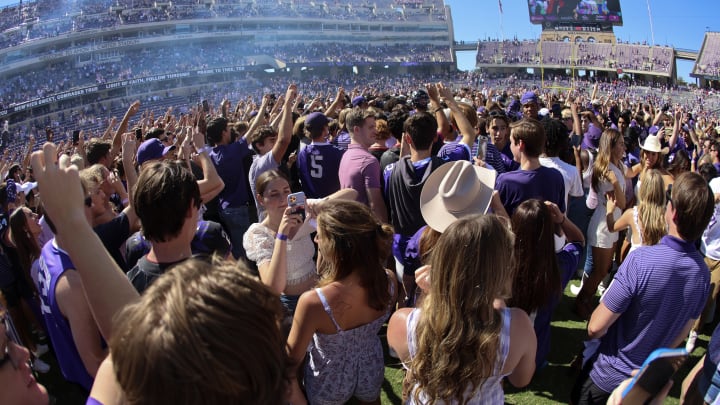One Commissioner’s Pitch: Let College Campuses Host Playoff Games

DALLAS—Mountain West Conference commissioner Craig Thompson, like thousands of others, watched Saturday’s rousing upsets and field-stormings that dominated college football.
TCU mounted a comeback to beat Oklahoma State, Utah stunned USC and Tennessee shocked Alabama. This trio of wild affairs had something in common: raucous celebrations at vibrant on-campus venues.
“Maybe we need to have more Playoff games on campus,” Thompson says.
Thompson sits on the CFP Management Committee, the group of conference commissioners who are charged with finalizing details of the expanded 12-team College Football Playoff. Under the expansion model adopted Sept. 2, first-round games are to be played at on-campus stadiums of the better seed (No. 12 at No. 5, No. 9 at No. 8, and so on). Quarterfinals and semifinals are played at bowl sites in a six-bowl rotation.
By incorporating the bowls, college football is clinging to a group of games deeply rooted in the sport’s history. However, not everyone agrees this is the best route.
“This is one man’s opinion,” Thompson says. “[College football] is a campus deal, right? It’s exciting. The excitement of college football is the pageantry.”
Moving the quarterfinals and semifinals from bowl sites to on-campus venues won’t happen in the early version of the expanded Playoff. Thompson and others say it has not been discussed within the room of commissioners, but Thompson adds it’s a possibility “down the road.” The next iteration of the Playoff could come as soon as 2026, when a new contract with media partners is finalized.
“That’ll be something that someone other than myself will be involved with,” says Thompson, who will retire at the end of this year.
For now, commissioners are focused on expanding in 2024 and ’25, years in which the CFP is contractually bound to ESPN as a media partner and the six New Year’s Day bowls. However, don’t write off bowls too quickly. The bowl industry is a powerful, wealthy and historically significant part of the sport. Nick Carparelli, the executive director of Bowl Season, the organization that oversees the bowls, has lobbied commissioners to have all Playoff games at bowl sites. In letters sent to the Management Committee, Carparelli cites several reasons: Bowls provide a more neutral environment; bowls are uniquely positioned to offer hospitality components, such as hotels and practice sites; are adept at the quick turnaround necessary to host the games; and are situated in warm-weather climates to avoid winter-related game impacts.
“We continue to feel the bowls are best suited to provide a quick turnaround these games need,” Carparelli said last month. “There are so many potential sites that could host these games. We are hopeful they continue to consider that an option.”
There is little to no sentiment to move the first-round games from on-campus stadiums to bowl sites. Like Thompson, many athletic administrators argue that quarterfinals should be played on campuses. The top four seeds will not host a postseason game—a competitive advantage and financial boon (although most, if not all, of home-ticket revenue is expected to go toward the CFP). Thompson says there are other reasons, most notably the aspect of travel. In this version of the Playoff, the quarterfinals, semifinals and national championship game are at neutral sites. That means three consecutive road trips for at least two teams and their fan bases, maybe more.
Only conference champions earn a first-round bye and a top-four seed. If a top-four seed advances to the title game, it would have likely played four straight games away from home: conference championship game, bowl quarterfinal, bowl semifinal and neutral-site title game. The bowl sites are spread across the country: Los Angeles (Rose), Phoenix (Fiesta), Dallas (Cotton), Miami (Orange), New Orleans (Sugar) and Atlanta (Peach).
Watch college football with fuboTV. Start your free trial today.
Using last season as an example, Alabama, the SEC champions, would have played the conference championship game in Atlanta on the first weekend in December and would then travel back to Atlanta for a New Year’s Day quarterfinal in the Peach Bowl, before moving on to a semifinal, likely at the Cotton Bowl the first weekend in January. And then it’s on to Indianapolis for the national championship game.
“We’ve talked about the traveling and having two teams traveling all that time,” Thompson says. “You have a conference championship and then you go to a quarterfinal and semifinal and you're asking your fans to travel?”
All of that said, Thompson is a believer in the bowl system and is a supporter of bowl games.
“I’ve said consistently that bowls have been a big part of the fabric of college football,” he says. “Ask 100 players and 100 coaches; they love bowl games, so you have to be cognizant of that.”
But will bowls continue in the future iterations of the College Football Playoff? Time will tell.
More College Football Coverage:

Ross Dellenger received his Bachelor of Arts in Communication with a concentration in Journalism December 2006. Dellenger, a native of Morgan City, La., currently resides in Washington D.C. He serves as a Senior Writer covering national college football for Sports Illustrated.